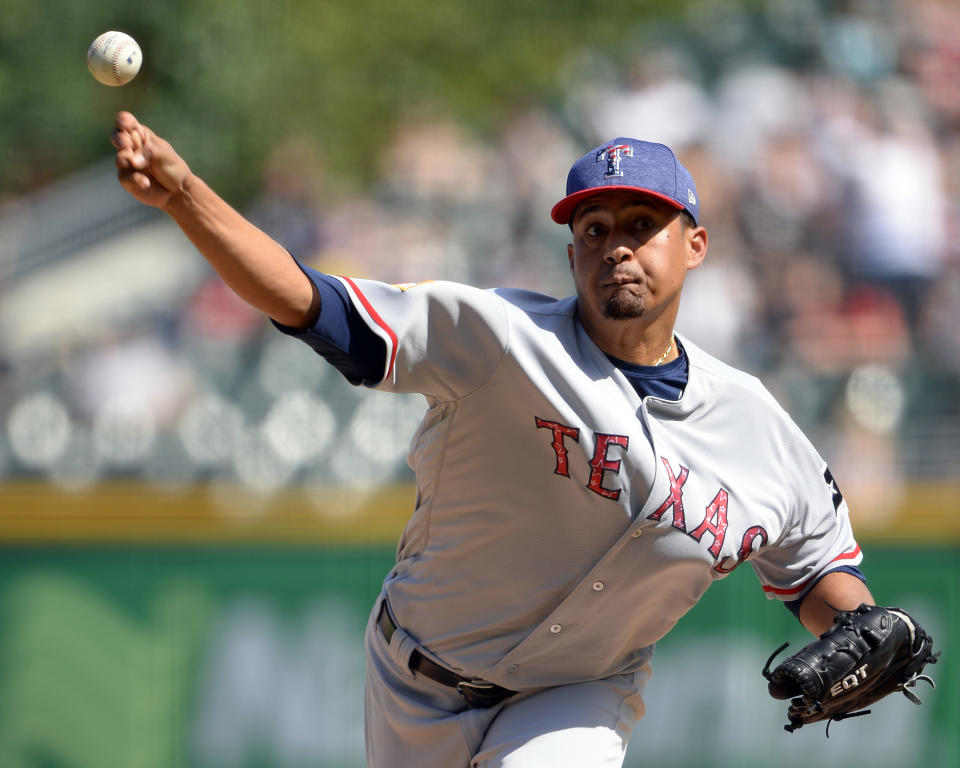How a youth coach in Colombia rebuilt a once-successful relief pitcher
PHOENIX – When Ernesto Frieri could find no way back, when he’d tried to do it everyone else’s way and his fastball would neither burn nor behave, he went home, all the way home, to the first real fields he ever played on, to the man who groomed them.
Maybe he would not find his fastball there, he knew. Sometimes when it’s time, it’s just time, and all the pitching coaches and thrashing about and tears would not change it. But when he left the Philadelphia Phillies that spring, 30 years old and confused and spent, he decided he’d left one part of it undone.
He called home.
There is a man who lives in Cartagena, Colombia named Marcial Del Valle. He was a catcher on the national team four decades ago, ran a baseball academy there and scouted for the San Diego Padres. He knew a good arm when he saw one, even if the boy attached to it was 10 or 12, even if the kid lived all the way out in the country, out in Sincerin, and even if Del Valle would have to dip into his own pocket for the kid’s bus fare.
He’d press a few pesos into little Ernesto Frieri’s hand for the 45-minute ride and he’d tell him, “You’re going to be somebody. You have talent. You’re going to make it to the big leagues. Come back tomorrow.”
Ernesto believed him, too, because Del Valle was a baseball god in Colombia and had become like a father to Ernesto, who didn’t know his own. He’d ride that bus on gifted money, dozing and floating on those words, “You’re going to be somebody.”
Two decades later, Del Valle picked up the phone.
“I need help,” Frieri told him. “I need to start from zero.”
“You know my door is always open to you,” Del Valle said.
A week later, they stood together on one of those fields, where the boys and girls stand in lines behind the pitcher’s mound to become the next Ernesto Frieri. Del Valle directed him to shortstop, away from the pitcher’s mound. He remained at home plate, a baseball in one hand and a bat in the other. They would start over. No more mechanics. No more grips. No more this leg here, this elbow there. No more thinking. Just catch the ball and throw it. Over and over, hundreds of ground balls, hundreds of step-and-throws to first base.
On day three, a fatigued Frieri, feeling impatient and still miles from reclaiming his fastball, asked, “For how long are we going to do this?”
Del Valle looked him square in the eyes and said, “Until you become a good shortstop.”
They finished that morning the same way. And the next morning. And the next. For a month.
Two years later, Frieri will pitch for the next several weeks to become a Milwaukee Brewer. He is 32. He still has a chance.
“I don’t know why I went to him last,” he said. “Maybe I was trying to do it on my own.”
They crowd onto the back ends of rosters and into the clubhouses, where they locker alongside others of their kind. They get the numbers nobody else wants, numbers most will view as temporary anyway, so what does it matter. They’re hanging on. They are onto something in their mechanics, healthy again, really serious this time, into the right situation, taking it day by day. They are young men in earth years, but getting on by the only measure that counts here. Ernesto Frieri – 304 big-league games, 303 1/3 big-league innings, 73 big-league saves, a 3.59 career ERA – stands with them. He once threw 100, or darn near, and then got lost in the little adjustments that would help him hold runners, or mix in a cutter or changeup or slider, or command that 100, and pretty soon everything about the most natural thing he’d ever done was foreign. He was utterly lost.

“I’m not blaming anybody,” he said. “I’m a grown man.”
In the 2012 and ’13 seasons for the San Diego Padres and Los Angeles Angels, Frieri saved 60 games. He struck out 196 batters over 134 2/3 innings. While big, his fastball also could have a mind of its own, as evidenced by the 60 walks and 20 home runs. But his ERA was 3.07, and the secondary pitches were coming, and it seemed just a matter of time before Frieri got better. He was getting better.
It didn’t happen. His ERA for the Angels in 2014 was more than 6. Traded to the Pittsburgh Pirates, he appeared in 14 games. His ERA was more than 10. By spring training in 2016, having signed with the Phillies, his velocity was gone too.
“I didn’t know where the ball was going,” he said. “I tried to go back to my old delivery, and I couldn’t remember it. Everything hurt.”
So this is Ernesto Frieri today, having kicked around a little the past couple years, having pitched for the Texas Rangers and in Mexico and a few stops in between. This is Frieri at his most confident, a wife and two little girls at home, they also sure this will be the spring, this will be the year. Again. He smiles at the thought of it, that the ball is still in his hand, that he still has a chance, that home is still where he left it. He feels like he’s throwing hard again, and that his slider and changeup are presentable enough.
“I’m happy,” he said. “I mean, I’m always happy. But I know everybody goes through different stuff. I’m no different than anybody. In life, you go through stuff. This stuff. That stuff.”
He shrugged. What the heck, he can be somebody again.
“I’m here,” he said. “I haven’t given up yet.”
More MLB on Yahoo Sports


